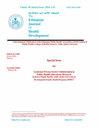What Should be a Rational Decision-Making Process about Screening Programs?
IF 0.5
4区 医学
Q4 PUBLIC, ENVIRONMENTAL & OCCUPATIONAL HEALTH
Ethiopian Journal of Health Development
Pub Date : 2021-01-01
DOI:10.32921/2225-9929-2021-3-43-26-34
引用次数: 1
Abstract
In this policy brief researched the experience of various countries of the world in making decisions about screening programs, as well as comprehensively analyzed the domestic experience in implementing screening programs.In Kazakhstan, the types of diseases for which it is necessary to introduce screening, as well as the rules for organizing screening, are determined by the decision of the leadership of the Ministry of Health of the Republic of Kazakhstan, based on consideration of the relevant departments and conclusion of specialized institutions. At the same time, the main attention is paid to the screening examinations themselves, and insufficient work is being done in the direction of scientific and methodological support for screening programs.The authors believe that it is necessary to develop evidence-based screening recommendations for the Ministry of Health of the Republic of Kazakhstan, as well as to use international criteria in making decisions regarding the introduction of new screening programs. It is necessary to provide a methodological decision-making process, involving independent organizations for evaluating screening programs, the public, and all stakeholders筛选项目的理性决策过程应该是什么?
本政策简报研究了世界各国筛选项目决策的经验,并综合分析了国内实施筛查项目的经验。在哈萨克斯坦,需要进行筛查的疾病类型以及组织筛查的规则,由哈萨克斯坦共和国卫生部领导根据有关部门的考虑和专门机构的结论作出决定。与此同时,人们主要关注的是筛查检查本身,在为筛查项目提供科学和方法支持方面做得不够。作者认为,有必要为哈萨克斯坦共和国卫生部制定基于证据的筛查建议,并在决定引入新的筛查方案时使用国际标准。有必要提供一个方法学上的决策过程,包括评估筛查项目的独立组织、公众和所有利益相关者
本文章由计算机程序翻译,如有差异,请以英文原文为准。
求助全文
约1分钟内获得全文
求助全文
来源期刊

Ethiopian Journal of Health Development
PUBLIC, ENVIRONMENTAL & OCCUPATIONAL HEALTH-
CiteScore
0.80
自引率
0.00%
发文量
0
审稿时长
>12 weeks
期刊介绍:
The Ethiopian Journal of Health Development is a multi and interdisciplinary platform that provides space for public health experts in academics, policy and programs to share empirical evidence to contribute to health development agenda.
We publish original research articles, reviews, brief communications and commentaries on public health issues, to inform current research, policy and practice in all areas of common interest to the scholars in the field of public health, social sciences and humanities, health practitioners and policy makers. The journal publishes material relevant to any aspect of public health from a wide range of fields: epidemiology, environmental health, health economics, reproductive health, behavioral sciences, nutrition, psychiatry, social pharmacy, medical anthropology, medical sociology, clinical psychology and wide arrays of social sciences and humanities.
The journal publishes the following types of contribution:
1) Peer-reviewed original research articles and critical or analytical reviews in any area of social public health. These papers may be up to 3,500 words excluding abstract, tables, and references. Papers below this limit are preferred.
2) Peer-reviewed short reports of research findings on topical issues or published articles of between 2000 and 4000 words.
3) Brief communications, and commentaries debating on particular areas of focus, and published alongside, selected articles.
4) Special Issues bringing together collections of papers on a particular theme, and usually guest edited.
5) Editorial that flags critical issues of public health debate for policy, program and scientific consumption or further debate
 求助内容:
求助内容: 应助结果提醒方式:
应助结果提醒方式:


